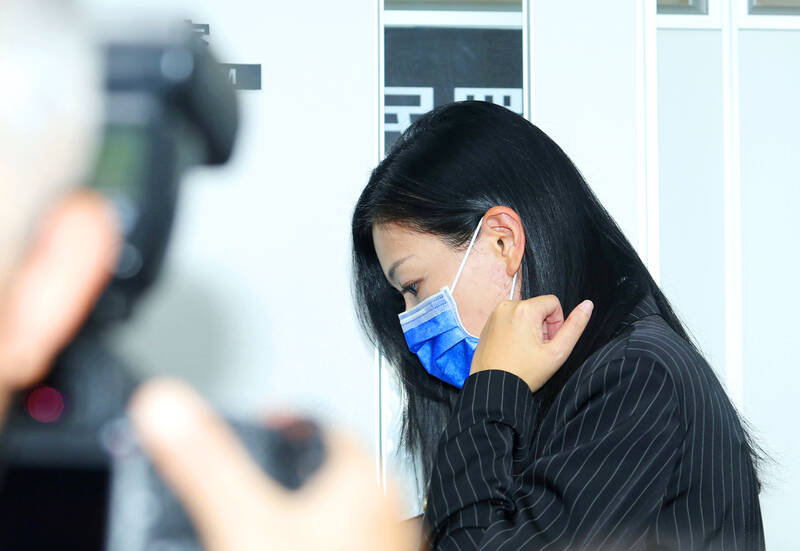Legislator Ann Kao (高虹安) was listed as a suspect yesterday after former legislative assistants of the Hsinchu mayoral candidate for the Taiwan People’s Party (TPP) accused her of making illegal payroll deductions and personal gains from public funds.
Lee Chung-ting (李忠庭), who is reportedly Kao’s boyfriend, was also listed as a suspect by the Taipei District Prosecutors’ Office, which said it opened the case after completing a preliminary assessment.
Several whistleblowers, reportedly former legislative assistants at Kao’s office, presented material to investigators showing that she registered Lee as an office assistant, despite his position with the Yonglin Foundation which paid an annual salary of NT$6 million (US$192,567), prosecutors said.

Photo: CNA
The Ministry of Justice’s Investigation Bureau passed the material and testimony on to prosecutors, the office said.
Kao and Lee are likely to face charges related to document forgery regarding alleged employee payroll deductions contravening the Labor Standards Act (勞動基準法), bureau officials said.
More serious charges might arise from the wage fraud allegations linked to Lee’s role in the legislative office, the bureau officials said, adding that Kao might have contravened Article 5 of the Anti-Corruption Act (貪污治罪條例).
The article stipulates a minimum seven-year term, and/or a fine not exceeding NT$60 million for “withdrawing or withholding public funds without authorization with an intent to profit, or unlawfully collecting taxes or floating government bonds.”
Legislative Yuan rules state that legislators are entitled to NT$500,000 per month to pay regular wages and overtime for up to eight office assistants, who generally earn NT$35,000 to NT$45,000 per month.
Kao’s campaign spokeswoman Hsu Chien-ching (徐千晴) said that “being listed as a suspect is normal procedure when a case is launched by prosecutors.”
“It does not mean they have been found guilty,” Hsu said. “Kao has already provided a lot of evidence to prove the office assistants were working and she submitted the documents to the authorities on her own initiative.”
Kao would respect the work of the prosecutors and would cooperate with the investigation, Hsu added.
“People should not make assumptions and mislead the public on this case to influence the election,” she said.
Material provided by whistleblowers alleged that the assistants had some of their wages illegally deducted, with the cash put into a coffer and spent by Kao on personal items, prosecutors said, adding that other material indicated that employees pay was deducted when they took sick leave.
There are allegations that Kao included in accounting documents people who did not work in her office, reported paying wages higher than what were actually provided and made false statements about overtime hours to obtain the maximum amount allowed each month from the Legislative Yuan, prosecutors said.
Kao has been linked to several controversies since she announced her candidacy.
She has been accused of plagiarism in her doctoral thesis and of collecting a corporate salary while on staff at a government-affiliated institute.

‘DENIAL DEFENSE’: The US would increase its military presence with uncrewed ships, and submarines, while boosting defense in the Indo-Pacific, a Pete Hegseth memo said The US is reorienting its military strategy to focus primarily on deterring a potential Chinese invasion of Taiwan, a memo signed by US Secretary of Defense Pete Hegseth showed. The memo also called on Taiwan to increase its defense spending. The document, known as the “Interim National Defense Strategic Guidance,” was distributed this month and detailed the national defense plans of US President Donald Trump’s administration, an article in the Washington Post said on Saturday. It outlines how the US can prepare for a potential war with China and defend itself from threats in the “near abroad,” including Greenland and the Panama

A wild live dugong was found in Taiwan for the first time in 88 years, after it was accidentally caught by a fisher’s net on Tuesday in Yilan County’s Fenniaolin (粉鳥林). This is the first sighting of the species in Taiwan since 1937, having already been considered “extinct” in the country and considered as “vulnerable” by the International Union for Conservation of Nature. A fisher surnamed Chen (陳) went to Fenniaolin to collect the fish in his netting, but instead caught a 3m long, 500kg dugong. The fisher released the animal back into the wild, not realizing it was an endangered species at

The High Prosecutors’ Office yesterday withdrew an appeal against the acquittal of a former bank manager 22 years after his death, marking Taiwan’s first instance of prosecutors rendering posthumous justice to a wrongfully convicted defendant. Chu Ching-en (諸慶恩) — formerly a manager at the Taipei branch of BNP Paribas — was in 1999 accused by Weng Mao-chung (翁茂鍾), then-president of Chia Her Industrial Co, of forging a request for a fixed deposit of US$10 million by I-Hwa Industrial Co, a subsidiary of Chia Her, which was used as collateral. Chu was ruled not guilty in the first trial, but was found guilty

DEADLOCK: As the commission is unable to forum a quorum to review license renewal applications, the channel operators are not at fault and can air past their license date The National Communications Commission (NCC) yesterday said that the Public Television Service (PTS) and 36 other television and radio broadcasters could continue airing, despite the commission’s inability to meet a quorum to review their license renewal applications. The licenses of PTS and the other channels are set to expire between this month and June. The National Communications Commission Organization Act (國家通訊傳播委員會組織法) stipulates that the commission must meet the mandated quorum of four to hold a valid meeting. The seven-member commission currently has only three commissioners. “We have informed the channel operators of the progress we have made in reviewing their license renewal applications, and